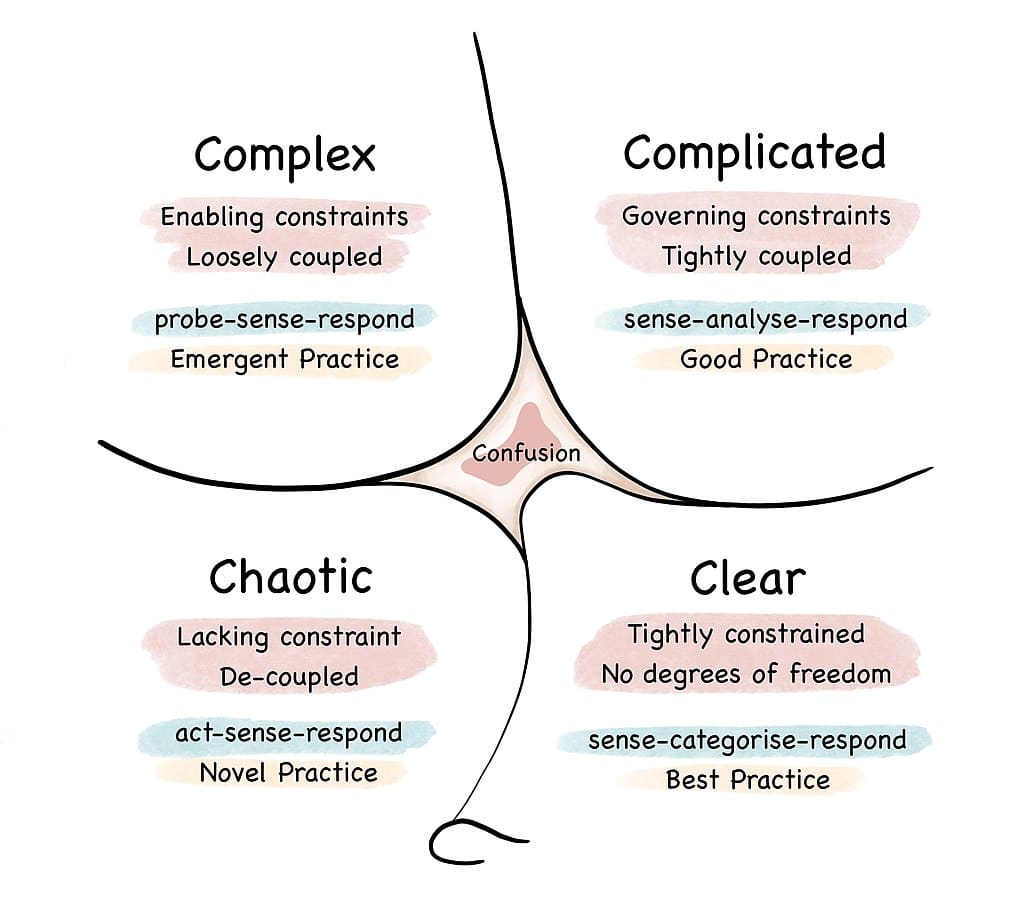Leaders continually seek frameworks and methodologies to guide decision-making and strategy in the complex and ever-evolving business landscape. The Cynefin framework, introduced by Dave Snowden in 1999 and detailed in a seminal 2007 Harvard Business Review article, stands out as a beacon for navigating these turbulent waters.
Understanding the Cynefin Framework
Cynefin (pronounced “ku-nev-in”) offers leaders a lens through which to view the context of their challenges and decisions. It distinguishes between five domains—Simple, Complicated, Complex, Chaotic, and Disorder—each requiring different leadership actions and decision-making approaches.
Simple and Complicated Contexts represent an ordered universe where cause-and-effect relationships are transparent (Simple) or require expertise to decipher (Complicated). Leaders can rely on best practices and expert analysis to guide their decisions in these domains.
Complex and Chaotic Contexts are unordered, with no clear relationship between cause and effect. These contexts require leaders to identify emerging patterns (Complex) or to act decisively to establish order (Chaotic).
Disorder, the fifth domain, is characterized by confusion and a lack of clarity about which of the other four contexts is prevalent. Leaders must diagnose and categorize the situation into the appropriate domain to effectively address it.
This framework challenges leaders to recognize the diversity of situations and adapt their approaches accordingly, moving beyond one-size-fits-all solutions to embrace the nuanced realities of their operational environments.
The Cynefin Framework and Adaptive Leadership
Snowden’s framework emphasizes the importance of context in decision-making and leadership.
In the Simple domain, leaders can often delegate decisions to those with direct experience, fostering autonomy and ensuring that established procedures are followed. Yet, this approach requires vigilance to prevent complacency and to remain open to signals that the context may have shifted.
In Complicated contexts, where multiple valid solutions may exist, leaders must balance reliance on expertise with openness to innovation from all organizational levels. Here, the framework suggests a more analytical approach, valuing diverse perspectives to unearth the best possible solutions amidst complexity.
Complex contexts call for a shift towards emergent solutions, recognizing that in the realm of “unknown unknowns,” the path forward cannot always be planned. Leaders must foster an environment where safe-to-fail experiments can reveal new directions, embracing a more experimental and iterative approach to problem-solving.
Chaotic contexts demand immediate action to stabilize the situation. Leaders must cut through the chaos with decisive actions that pave the way from turbulence to a more manageable state, using clear communication and rapid response to navigate crises.
Finally, the state of Disorder demands that leaders first clarify their understanding of the situation by breaking it down into constituent parts, thereby identifying the predominant context to apply the most appropriate strategies.
Sense-Making and Sufficiency
Embedded in the Cynefin framework is Snowden’s advocacy for sense-making and the principle of sufficiency. Leaders are encouraged to actively engage with their environment, drawing on diverse inputs to shape their understanding and actions. This engagement fosters a nuanced grasp of complex situations, enabling leaders to navigate ambiguity with informed agility.
Furthermore, the principle of sufficiency highlights the pragmatic aspect of leadership decisions within the Cynefin framework. It acknowledges the limitations of seeking perfect solutions in complex situations, advocating instead for timely and contextually appropriate responses that are “good enough” to address current challenges.
Applying Cynefin to Organizational Growth and Innovation
In practice, the Cynefin framework empowers organizations to:
- Navigate Complexity by identifying the nature of their situation, allowing for more nuanced and effective decision-making.
- Foster Innovation by understanding that complex problems often require emergent, innovative solutions, encouraging a culture of experimentation and adaptation.
- Enhance Communication and collaboration by acknowledging the diverse perspectives and expertise required to tackle problems across domains.
Conclusion: Embracing Complexity for Sustainable Success
The Cynefin framework offers leaders a profound tool for navigating the complexities of modern organizational life. By accurately assessing the context of each situation, leaders can adapt their strategies, promoting resilience, adaptability, and, ultimately, sustainable success.
In embracing the Cynefin framework, we reflect RoundMap’s core values: the belief in the power of systems thinking, the importance of continuous learning, and the pursuit of collaborative empowerment. As we navigate the complexities of today’s business environment, the Cynefin framework stands as a testament to the importance of adaptability and the nuanced understanding of the landscapes we navigate, empowering leaders to make informed, context-sensitive decisions in an unpredictable world.
Author
-
Edwin Korver is a polymath celebrated for his mastery of systems thinking and integral philosophy, particularly in intricate business transformations. His company, CROSS-SILO, embodies his unwavering belief in the interdependence of stakeholders and the pivotal role of value creation in fostering growth, complemented by the power of storytelling to convey that value. Edwin pioneered the RoundMap®, an all-encompassing business framework. He envisions a future where business harmonizes profit with compassion, common sense, and EQuitability, a vision he explores further in his forthcoming book, "Leading from the Whole."


